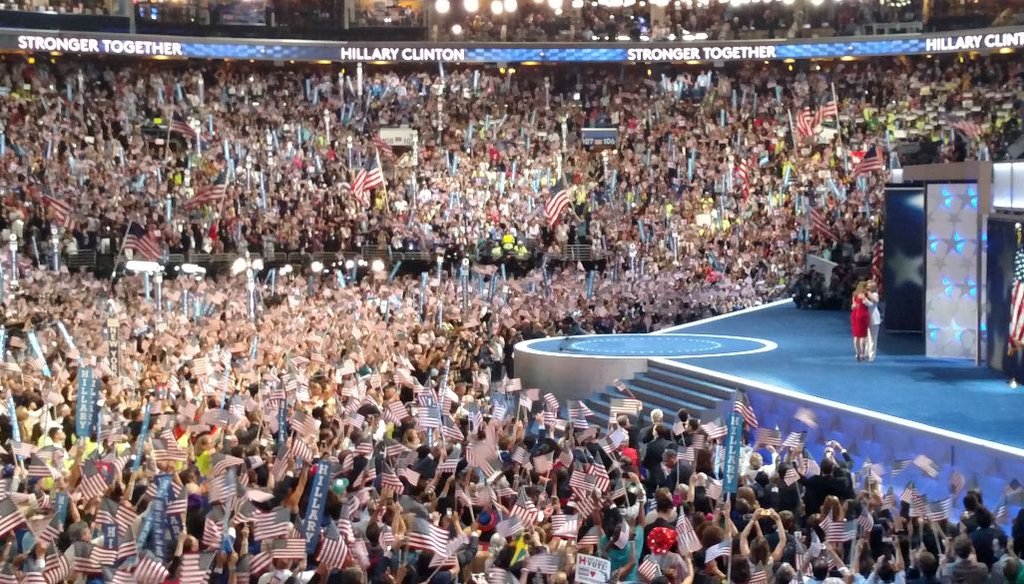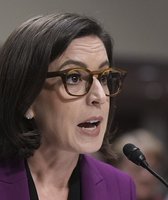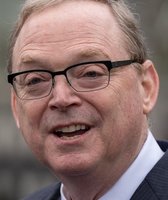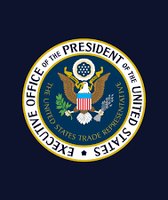Stand up for the facts!
Our only agenda is to publish the truth so you can be an informed participant in democracy.
We need your help.
I would like to contribute

Hillary Clinton accepts the Democratic presidential nomination in Philadelphia in 2016. (Louis Jacobson/PolitiFact)
If Your Time is short
-
The party conventions, gatherings of up to 50,000 people, are in jeopardy this year because of concerns about the coronavirus pandemic.
-
If one or both parties cancels their in-person conventions, they would likely shift to a scaled-down, internet-only event.
-
The parties should be able to shift to remote voting for nominees and other party business, but they would have to act soon to change the rules.
UPDATED, April 2, 2020: This article has been updated to reflect the decision by the Democratic National Committee to delay its convention until August.
Can the Democratic and Republican conventions survive in an era of coronavirus? That’s unclear, and it’s a question that needs to be resolved quickly.
Historically, the parties’ conventions are a focal point of presidential election years. Festooned with shiny backgrounds and balloon drops, the conventions receive four days of intense media attention as the presidential and vice presidential nominees step out on the national stage.
The 2020 Democratic National Convention had been scheduled for July 13 to 16 in Milwaukee, but on April 2, news broke that the party will delay the convention to Aug. 17 to Aug. 20, which is one week before the Republican convention. The GOP convention is scheduled for Aug. 24 to 27 in Charlotte.
Officially, both conventions are still on. But as the nation hunkers down to ride out the coronavirus pandemic, there’s growing concern about holding in-person conventions even in August.
Sign up for PolitiFact texts
The conventions are planned years ahead of time by party officials and host committees for each city. The host cities expect up to 50,000 visitors to come, making it a major economic event. So canceling the conventions would be a significant and painful step.
Democratic National Committee chair Tom Perez told Axios on April 2 that "we are working with our state and local partners, and I'm confident" that the party can work out a plan "that will enable us to have our convention," he said.
For his part, President Donald Trump remains committed to holding a traditional convention. He told Fox News’ Sean Hannity, "No way I’m going to cancel the convention. We’re going to have the convention. It’s going to be incredible."
But what would happen if in-person conventions couldn’t happen at all because of continuing concerns about coronavirus? Here are a few questions and answers.
What would a virtual convention look like?
A remote convention could be structured around a series of events on broadcast and social media, Colorado State University political scientist Kyle Saunders told Sabato’s Crystal Ball at the University of Virginia’s Center for Politics.
"You could do speeches and floor votes, with watch parties at local and state party headquarters," Saunders said. "That could be a unifying, positive event that builds party rapport and purpose — if the parties could find a way to pull it off."
The official business conducted at the convention — the certification of the delegates, the passage of convention rules, and the nomination of the presidential and vice presidential candidates — can probably be redesigned to be handled online, with appropriate planning, experts said.
Jo Ann Davidson, a Columbus, Ohio-based Republican official and a key planner of the 2008 and 2016 Republican conventions, said that because political people love conventions, they will be hard to give up. "I think it would be an extreme change," Davidson said.
Then again, she added, thanks to coronavirus, "people will be dealing with lots of extremes they haven’t ever gone through before."
Beyond the speeches and photo opportunities, what actual business gets conducted at a convention?
Each convention generally includes four pieces of official business.
• Certification of the delegates: This is the process the party uses to confirm who occupies each delegate slot. Sometimes the choice of a delegate is contested due to procedural complaints; certification is the process for resolving these disputes.
• Approving the rules of the convention: These are the rules that govern how the convention is run — for instance, how long the nominating and seconding speeches will go. Typically, the rules are hashed out by the DNC the weekend before the convention starts, with delegates voting on the rules package on the first day of the convention.
• Electing the officers of the convention: The delegates need to vote to approve the formal officers of the convention; this typically occurs on the first evening of the convention.
• Nomination of the presidential and vice presidential candidates: These nominations are the high point of any convention, when the candidates make their formal coming-out party on the national stage.
Delegates and officials mingle on the floor during the 2016 Republican convention in Cleveland. (Louis Jacobson/PolitiFact)
Can this voting be done remotely?
Currently, the Democrats couldn’t, but that could be changed.
The Democratic National Committee could meet remotely and change the rules to allow remote voting for conventions. This would require a simple majority vote of the DNC membership. Alternatively, or in conjunction, the DNC could vote on a permanent bylaw, which would need a two-thirds vote to pass.
"I don’t think it’s a tremendous obstacle to change the rules — you just have to be upfront and transparent about it," said Josh Putnam, a political scientist who specializes in delegate selection rules and presidential elections.
The Republicans’ process is a little easier. The party’s current rules say that if the party "determines that the national convention cannot convene or is unable to conduct its business either within the convention site or within the convention city," then the Republican National Committee is given the power to create a remote voting process for the nominations.
Could a convention be held with just delegates, candidates and party officials, without families, journalists and other unofficial attendees?
In theory, a convention could be made delegates-only. But even a gathering that small would not significantly reduce health concerns.
"Would even the 5,000 delegates and staff want to get on a plane and stay in a hotel and eat at restaurants and gather in the arena?" said the Rev. Leah D. Daughtry, who headed the 2008 and 2016 Democratic conventions. "I have older parents. I would think five times before doing that. I’m not sure what I’d bring home."
What are some of the other challenges to holding a virtual convention?
Unlike the Republicans, who have a clear nominee in the incumbent president, the Democrats’ primary race is still under way. While Biden has what political observers consider a solid lead in delegates, he hasn’t yet collected the required 1,991 delegates to secure the nomination.
Sen. Bernie Sanders, I-Vt., remains in the race. If Sanders were to exit the race early and concede the nomination to Biden, that would make it easier to plan a remote convention, since it would rule out a second ballot that includes voting by "superdelegates," experts say. Superdelegates are lawmakers and other senior Democrats who, under the current rules, don’t vote unless no candidate wins a simple majority of delegates in the first round.
But if Sanders remains in the race until the convention, that could add wrinkles to the planning for a remote convention.
Our Sources
Sabato’s Crystal Ball, "Virtual Conventions: Health Crisis Forces Both Parties, Particularly The Democrats, to Envision the Possibility," March 31, 2020
Politico, "Biden: Difficult to imagine having Democratic convention as scheduled," April 1, 2020
New York Times, "Biden Calls for Democratic Convention to Be Delayed Because of Virus," April 2, 2020
Email interview with Kyle Saunders, Colorado State University political scientist, March 25, 2020
Email interview with Alan Abramowitz, Emory University political scientist, March 26, 2020
Interview with Josh Putnam, political scientist who specializes in delegate selection rules and presidential elections, March 24 and April 1, 2020
Interview with Christopher Wlezien, University of Texas-Austin political scientist and co-author of the book, "The Timeline of Presidential Elections," March 27, 2020
Interview with Jo Ann Davidson, former speaker of the Ohio House of Representatives and a key planner of the 2008 and 2016 Republican conventions, March 29, 2020
Interview with Rev. Leah D. Daughtry, who headed the 2008 and 2016 Democratic conventions, March 26, 2020



































